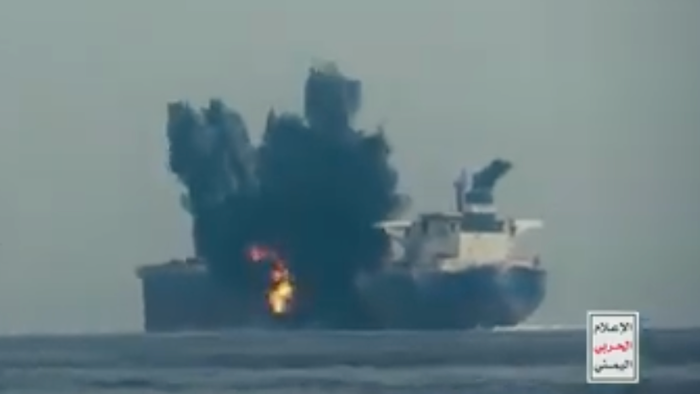The Biden-Harris administration is currently grappling with a series of critical challenges, both domestic and international, that have garnered varying degrees of attention. One of the most pressing yet underreported issues involves the recent resurgence of attacks by Iranian-backed Houthi rebels on commercial vessels in the southern Red Sea, a vital maritime chokepoint for global trade. Notably, a report from intelligence firm SynMax highlighted two vessels, the Panama-flagged Cordelia Moon and the Liberian-flagged Minoan Courage, as targets of Houthi aggression. The escalation of hostilities in this strategic region is indicative of heightened regional tensions, which have significant implications for international shipping safety and broader geopolitical stability.
On October 1, the Cordelia Moon was struck during a multi-stage attack involving missiles and an unmanned surface vessel (USV), approximately 64 nautical miles from Al Hudaydah, Yemen. The Joint Maritime Information Center (JMIC) confirmed the vessel sustained damage but did not require assistance, and its crew remained unharmed. The incident underscores the current risk assessment that vessels associated with Israeli, U.S., or U.K. interests are particularly vulnerable to Houthi attacks, notably those linked to companies with prior port calls to Israel. This situation has escalated concerns for commercial shipping in the Red Sea, where over 80 attacks on vessels have occurred in the past year alone, leading to significant casualties and material losses.
In the wake of these developments, the shipping industry is experiencing severe disruptions, prompting many vessels to reroute around the Cape of Good Hope to avoid the Red Sea chokepoint. These altered shipping routes are straining global supply chains, resulting in logistical challenges and increased transportation times for goods. Maritime expert Noam Raydan recently emphasized in discussions on social media that these ongoing attacks have far-reaching consequences, detailing how the fluctuations in oil supply and the dangers posed to commercial shipping by Houthi forces are reshaping maritime dynamics in the region.
The Biden administration’s response, characterized by "Operation Prosperity Guardian," aimed at ensuring freedom of navigation and maritime security in the Red Sea, has been criticized for its apparent ineffectiveness. The operation’s shortcomings are becoming increasingly evident as regulatory bottlenecks and safety concerns lead to delays at global ports, such as Singapore, where an unusual number of ships are reported to be stuck, highlighting the intersection of commerce and geopolitics. The over-crowding of shipping routes due to the escalating risks in the Red Sea not only disrupts global supply chains but also casts doubt on the U.S. administration’s capability to maintain its credibility and deterrent power in international waters.
Adding to this somber landscape is the analysis from Erik Prince, a former Navy SEAL and founder of Blackwater, who has raised alarms about the implications of the Red Sea’s congestion for Western interests. He argues that the cumulative impact of these maritime security threats is contributing to an erosion of U.S. credibility and deterrence in a region that is already fraught with geopolitical instability. This perspective highlights the urgency with which the Biden administration must address these maritime security challenges to protect U.S. interests and those of its allies.
As the situation evolves, the repercussions of these Houthi attacks extend beyond immediate security concerns, affecting global trade dynamics and national interests in a precarious geopolitical landscape. The Biden administration is at a critical juncture, requiring an effective strategy to tackle the maritime threats posed by the Houthis while also addressing the underlying tensions in the Middle East that have led to this escalation. The response to such incidents will determine not only the safety of commercial shipping but also the broader implications for U.S. foreign policy and its long-term standing in the region.

